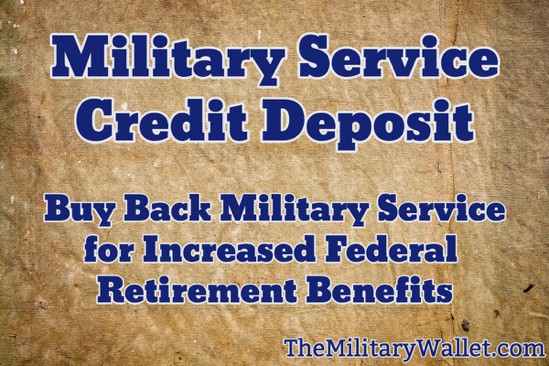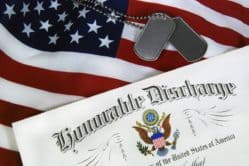Podcast: Play in new window | Download
Subscribe: Apple Podcasts | RSS
Table of Contents
- Meet Our Expert, Eddie Wills of GubMints.com
- What You Will Learn in Today’s Podcast:
- How the Federal Employee Retirement Systems (FERS) Works
- Buying Back Military Time with a Military Service Credit Deposit
- Federal Service Computation Dates
- Service Computation Date – Civilian
- Service Computation Date – Leave
- Service Computation Date – Reduction in Force
- You Must Buy Back Your Military Time to Change Your SCD RIF Date
- How Much it Costs to Buy Military Service Credits
- Variable Interest Rates
- What if you don’t have good records?
- Request a copy of your military records.
- Actually Buying Back Your Time.
- Who Can Buy Back Their Military Time?
- Benefits of Buying Back Your Military Time
- Who Should Buy Back Their Military Time?
According to federal data, over 30% of federal and civil service employees are military veterans. Continuing one’s career as a civilian government employee is a great way to continue serving our country.
There are also some excellent benefits for veterans who wish to work for the federal government. Among them are Veteran’s Preference Points, which can help you land a job with the government. And, if you are willing to buy back your military time through a Military Service Credit Deposit, you can enjoy other benefits, such as increased leave accrual per pay period, faster vesting of your Thrift Savings Plan agency contributions, and you may even be able to retire earlier than you otherwise might have without credit for your military service.
In today’s podcast, we will discuss buying back your military time, how to do it, and the benefits of doing so.
Meet Our Expert, Eddie Wills of GubMints.com
In this podcast, I interview Eddie Wills, a military veteran who writes about Personal Finance and Benefits for Federal Employees and Veterans at this site, GubMints.com, where he helps federal employees and military veterans navigate the tricky paths of federal benefits, including buying back military time, computing your service dates, applying for retirement, understanding your Thrift Savings Plan benefits, the Federal health insurance system, and much more.
Today he is joining us to discuss Military Service Credits, or “Buying Back” Military service time in order to increase your federal pension. This is an important topic for all veterans currently serving in the Federal Service, or those who are considering going into the Federal sector after they leave the military.
What You Will Learn in Today’s Podcast:
- How the Federal Employees Retirement System (FERS) works
- How Eddie Retired with 9 Years of Federal Service and will earn a pension at age 60.
- How Eddie will Receive two Federally insured pensions Starting at Age 60 – one from the Navy Reserves, and one from the FERS retirement system.
- The value of an inflation adjusted pension (hint: it’s worth hundreds of thousands of dollars, if not more!).
- How buying back your military time can:
- Increase the amount of vacation time you accrue each pay period
- Help you if there is a Reduction in Force (RIF) by allowing you to choose early retirement, or possibly be passed over for a RIF because of your seniority
- Get your Thrift Savings Plan agency contributions vested more quickly
- Why everyone who is eligible to buy back their military time should do so (other than current military retirees)
- And more!
How the Federal Employee Retirement Systems (FERS) Works
We’ll give you a brief overview of the FERS retirement system so you have an understanding of it before we jump into the rest of the article. The FERS retirement plan is like a three-legged stool—it has three distinct elements:
- The Federal Pension Plan (eligibility). The pension is determined by multiplying your years of Federal Service by the average of your top three years of pay (example, 20 years of service with an average of $100,000 for your top 3 years of earnings equals an annual pension of $20,000). Some retirees are eligible for early retirement and can earn their pension before age 60. This is usually offered to eligible employees during a Reduction in Force (RIF).
- Thrift Savings Plan. Federal Employees receive an agency matching contribution to their TSP, up to a maximum of 5% of their pay.
- Social Security Benefits. (Note: certain military members are eligible for increased Social Security Benefits, depending on the dates which they served).
This system is designed to give retirees 3 sources of income, which they can use to fund their retirement. And, as Eddie tells us in the interview, federal service employees are also eligible to earn a separate retirement from the Guard or Reserves without it affecting their FERS retirement benefits (this is not the case for active duty retirees).
ADVERTISEMENT
Buying Back Military Time with a Military Service Credit Deposit
The FERS retirement system will reward those who have worked in the federal service, including military veterans. But in order for your military time to count toward a FERS retirement, you need to give the civil service the information they need to account for your time served. And if you want your military time to count toward a FERS pension, then you need to make a Military Service Credit Deposit to buy into the pension (this is required since you wouldn’t have paid into the pension plan during those years served).
We’ll cover details for making a Military Service Credit Deposit a little later in this article. For now, let’s look at Federal Service Computation Dates, which are important for calculating seniority, leave accumulation, and other factors.
ADVERTISEMENT
Federal Service Computation Dates
Federal Service Computation Dates are used to determine several aspects of your federal service benefits. There are three primary Service Computation Dates (SCD) we will look at, including:
- SCD Civilian – the date you enter civilian federal service
- SCD Leave – the date used for computing your leave accrual rate
- SCR Reduction in Force (RIF) – used for seniority
These dates are all very important, so let’s jump in and see how they affect your service.
Service Computation Date – Civilian
Your SCD Civilian date you start your civil service job. This is almost always on a Monday at the start of a pay period.
This starts the date for your FERS life insurance benefit (not FEGLI; the FERS life insurance is a free benefit). This is important because there is a change for life insurance benefits at the 10 year mark.
The Thrift Savings Plan Computation Date is important because at the 3 year mark you are completely vested in the agency contributions made by the government into your Thrift Savings Plan Account.
Service Computation Date – Leave
The SCD Leave date is used to determine how quickly you accrue leave. This is the date listed in the upper right corner of your civilian Leave and Earnings Statement, or LES. If you don’t have any military experience, this would be the same as your SCD Civilian Date.
How to get credit: If you are a non-retired military veteran*, you only need to turn in DD214 to your HR office to gain additional seniority as a federal employee. This is a one-to-one benefit. This is valuable because you accrue leave more quickly once you have over 3 years of federal service.
For example, until you reach 3-years of civilian service, you accrue 4 hours of annual leave per two-week pay period, but you accrue annual leave at 6 hours per pay period between 3 and 15 years of civilian service. Over 15 years of civilian service, you accrue one day off work (8 hours) of annual leave, per pay period.
This is an extremely valuable benefit, not just for the time off that you will accrue, but because you can later sell your leave days when you leave federal service. This time off is on top of your sick leave and your days off work for federal holidays.
Federal employees can carry up to 240 hours of leave across a calendar year, so this gives those leaving federal service the opportunity to sell up to 30 days of leave when they leave the service, which is the equivalent of an extra month’s pay. Here is more information about annual leave for civil service employees.
*Military retirees can also apply to have some of their service count toward their SCD Leave date, but only the days which they served in a named campaign or in certain deployments. Eddie lists more details on his site: Military Service Credit Deposit – Retired From Active Duty.
Service Computation Date – Reduction in Force
Your SCD RIF date determines your seniority if there is a Reduction in Force. To get this, you have to buy back your time with a Military Service Credit Deposit (more on this below).
The time you buy back can allow some members to retire at age 50 if they have 20 years of federal service and the government offers them a Voluntary Early Retirement.
This is a full retirement and retirees can receive the Federal Employee Health Benefit at the regular employee charge. Being able to take early retirement and receive the retiree health care benefits is a huge advantage for many federal employees. Eddie is clear to note that early retirees under a RIF do not have to pay the COBRA health care costs, but will pay the same amount as federal employees, making early retirement a nice option for many service members.
If you buy back your time, your SCD RIF date will match your SCD Leave date.
You Must Buy Back Your Military Time to Change Your SCD RIF Date
This is where you have to decide to buy back your military service time to count toward your federal service. If you decide to buy back your military service time, you will have to write the government a check for 3%* of the base military pay you earned while you were in the military, or have the amount withheld from your future paychecks. (*except for the period of 1999-2000, which has a slightly higher buyback rate).
How Much it Costs to Buy Military Service Credits
If you buy back your military service credits within two years of joining the civil service, you will pay the rates in the first table below. If you take longer to buy back your military service credits, you will pay the rates below, plus a variable interest rate that is based on the year of service (see second chart).
| Dates of Service | Amount of Deposit Due |
|---|---|
| Through 12/31/98 | 3% of military basic pay |
| 1/1/99 through 12/31/99 | 3.25% of military basic pay |
| 1/1/00 through 12/31/00 | 3.4% of military basic pay |
| 1/1/01 to the present | 3% of military basic pay |
Variable Interest Rates
The Variable Interest Rates are applied to the rates from the above table if you do not buy back your military service credits within the two year period.
| Years | Percentage Rates |
|---|---|
| 2021 | 1.375% |
| 2020 | 2.250% |
| 2019 | 2.75% |
| 2018 | 2.125% |
| 2017 | 1.875% |
| 2016 | 2.0% |
| 2015 | 2.0% |
| 2014 | 1.625% |
| 2013 | 1.625% |
| 2012 | 2.25% |
| 2011 | 2.75% |
| 2010 | 3.125% |
| 2009 | 3.875% |
| 2008 | 4.75% |
| 2007 | 4.875% |
| 2006 | 4.125% |
| 2005 | 4.375% |
| 2004 | 3.875% |
| 2003 | 5% |
| 2002 | 5.5% |
| 2001 | 6.375% |
| 2000 | 5.875% |
| 1999 | 5.75% |
| 1998 | 6.75 % |
| 1997 | 6.875% |
| 1996 | 6.875% |
| 1995 | 7% |
| 1994 | 6.250% |
| 1993 | 7.125% |
| 1992 | 8.125% |
| 1991 | 8.625% |
| 1990 | 8.750% |
| 1989 | 9.125% |
| 1988 | 8.375% |
| 1987 | 9% |
| 1986 | 11.125% |
| 1985 | 13% |
| 1948-1984 | 3% |
| Before 1948 | 4% |
Receiving credit for this time requires math, filling out some forms, and some homework on your part. But it is worth every bit of time and effort you put into it.
You will need to give your civil service HR department copies of your DD214 and any related pay stubs you might have. The buy back is based on your previous military earnings, so having copies of your LES’s will make it easier for the HR department to determine when you received pay raises from promotions and time in service raises.
What if you don’t have good records?
The HR department can figure out your effective pay based on your DD 214 and historic pay tables. However, Eddie mentioned it is much easier to do the computations yourself to not only make their job easier, but so you can ensure accuracy. No one has a greater interest than you in making sure the calculations are done correctly. So do your homework on your end to ensure accuracy to make sure you don’t have to 1) pay more to buy back your military time, and 2) you get credit for all your military time.
Request a copy of your military records.
You can also request a copy of your military service records from either your branch of service’s records bureau or from the National Archives if they have already been sent there.
Actually Buying Back Your Time.
Once the calculations are complete, you can buy back your time by writing the government a check, or through payroll deductions over the next couple of years. You must buy your military service credits within two years of beginning your federal service or the balance will accrue interest. The interest rates vary based on the year(s) of your military service and are determined by the Department of the Treasury every year. You can find the interest rates on the OPM website.
Note: Visit the GubMints Comprehensive Military Service Credit Deposit Guide to learn how to compute your Military Service Credit Deposit and determine if you should buy your time back. Or you can buy Eddie’s book on Amazon, for less than a cup of coffee.
Who Can Buy Back Their Military Time?
All non-retired military veterans can buy back their military service time through a Military Service Credit Deposit. You should consider buying back your military time even if you don’t think you will work for the federal government for a long time.
You only need 5 years of federal service to qualify for a deferred annuity, which is a pension you can begin drawing at age 62. Even a small pension will be valuable in your retirement years.
Graduates from the Service Academies can also buy back their academy time, which is an amazing benefit because Service Academy Cadets only earned a small stipend during their Academy days. This makes the cost to buy that time inconsequential compared to the return they would receive in federal service time and annuity value.
Note:
Members of the Guard and Reserves are able to buy back their active duty time and work toward dual pensions. This is what Eddie is doing. He applied his active duty time toward his FERS retirement, and he will receive his FERS pension when he reaches age 60. He is also working toward his retirement from the Navy Reserves, which he would also receive at age 60 (unless he is eligible for early Reserve retirement pay).
Federal law prohibits retired active duty military members from buying back their military time and adding it to their FERS pension (this is because they are already receiving compensation for their military retirement). As noted earlier, military retirees should still look into getting credit for their Service Computation Date for Leave.
Benefits of Buying Back Your Military Time
When you buy back your military service dates, you receive a day for day accrual of your time as an active duty service member. Every single day counts towards your federal service FERS annuity pension plan. So the longer you served, the more valuable buying back your time will be.
As mentioned earlier, the FERS pension is based on your years of service and the average of your highest three years of pay. Eddie gives an example of someone earning an average of $100,000 a year for their final three years of service with 20 years of creditable service. This would equate to a $20,000 a year pension (25 years of service at $100,000 average of high pay would be $25,000 in pension benefits). Like military retirement pay, the FERS pension plan is adjusted annually for COLA, so it increases in most years. (Full Computation Explanation).
Note: There is a time limit to make your Military Service Credit Deposit:
You have a two-year short window to buy back your military time, or you would otherwise have to pay interest on the balance. Here are the interest rates.
Who Should Buy Back Their Military Time?
Almost everyone who is eligible. There are only a few edge cases where it doesn’t make sense to buy back your time, but those instances are rare. In all cases, you should run the numbers to be sure. Eddie will show you how on his guide.
Better yet, buy his book on Amazon, The GubMints Gouge for Maximizing your Service Computation Date. The book is much more detailed than the article on his site and is very affordable (click to see current prices on Amazon). It can help you earn hundreds or thousands of dollars in return.
Additional Resources:
The FERS retirement system can be complicated. So please keep in mind this podcast and article can only provide a top-level overview of the Military Service Credit Deposit and related FERS rules and benefits. I recommend reading the following articles for more information, and speaking with your HR representative if you are already currently employed with the federal government.





Comments:
About the comments on this site:
These responses are not provided or commissioned by the bank advertiser. Responses have not been reviewed, approved or otherwise endorsed by the bank advertiser. It is not the bank advertiser’s responsibility to ensure all posts and/or questions are answered.
Jennifer Smith says
Hello, I bought back my military time of almost 11 years. When I worked for the AF as a civilian they back dated both my SCD and SCD leave date to reflect the time I bought back (2004). When I took a GS position with the Coast Guard they changed my SCD leave date to reflect when I joined civil service (2014) and will not change the date back to 2004 reflecting my buy back. Does buy back not include SCD leave date?
Ryan Guina says
Jennifer, I recommend speaking with your HR department for clarification. My understanding is that your Military Service Credits should apply to your SCD date and leave date. If your HR department won’t provide clarification, ask them how to escalate your request to a higher authority. Best wishes!
Terry says
I am retired Military E8 and have been drawing a Military Retirement for 26 years. I have 13 years as a government civilian. Can and should I buy back my military time. How does that work? Does my army retirement stop? I plan on retiring in Dec 2023.
Ryan Guina says
Terry, buying back military time as an active duty retiree is possible. However, you can only count your active duty military time toward military retirement OR federal civil service retirement. Your time can’t count toward both. You can only count active duty time toward military retirement and civil service retirement for a Guard or Reserve retirement.
So, yes, it is possible, but you would need to run the numbers to determine if it is worthwhile. In most cases, it is not. However, it never hurts to run the numbers. Be sure to work closely with your civil service Human Resources office to have a calculation run to determine how buying back your military time would impact your civil service retirement benefits. Then, you will want to speak with a military finance and/or personnel specialist to determine how your military retirement would be impacted.
Best wishes!
NORBERT BAKER says
I served 11 years, 9 months in the Air Force and i am currently working at the VA hospital in Syracuse, NY since 27 Apr 2020. When i’m visted for retirement, pension. I am buy back my time at @ $75.00 per pay period. Do I have to have 5 years working at the VA hospital to receive a pension from the VA.
Ryan Guina says
Norbert, Yes, you will need to work for the civil service for a minimum of five years to be eligible for a civil service pension. Best wishes!
David King says
I serve 9 years in the Navy reserve from 1981 to 1991, and in the summer I would do class B service for 3 to 4 months, I want to by back my years of services, but HR said that I could only buy back my class B services, and it has to be 6 months are more continuous.
this does not make sense to me, can I not buy back my class A service.
I current work for DND, do you know who i can contact about buying back my Navy Reserve service time.
Ryan Guina says
David, you can only buy back your active duty time. You cannot buy back Reserve service. Your HR office should be able to help you understand the total amount of time you can buy back. Best wishes!